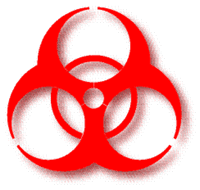Sites of interest on the World Wide Web—edited by Rick Neubig
Bioterrorism

On the minds of many people these days is the risk of chemical and biological terrorism. There are many sites devoted to these topics. A National Public Radio series called “Plague Wars” highlights the problem of biological weapons (http://www.pbs.org/wgbh/pages/frontline/shows/plague/). The Organization for Prohibition of Chemical Weapons details the chemistry and pharmacology of chemical weapons and their countermeasures (http://www.opcw.nl/chemhaz/cwagents.htm). A simple illustrated guide to nerve gases is provided in the Neuroscience for Kids pages (http://faculty.washington.edu/chudler/neurok.html) at the University of Washington. The Centers for Disease Control has an official page on Bioterrorism (http://www.bt.cdc.gov/) with updated news and authoritative information about different biological hazards. A number of organizations also have information about attempts to limit the spread of chemical and biological weapons (http://www.fas.org and http://cns.miis.edu/).
Untangling the Tangles of Alzheimer Disease

The role of proteolytic enzymes in the etiology of Alzheimer disease is one of the important recent developments in the understanding of this devastating disorder, and has initiated new therapeutic approaches. In this issue (pp 198–207), Li reviews research focusing on one of the Alzheimer proteases, or secretases, namely, γ-secretase. A wonderfully lucid account of our understanding of the disease, written by a major contributor to the field for scientific american, is available online (http://www.sciam.com/2000/1200issue/1200Stgeorge.html). Two other Websites provide updated information about clinical trials and new ideas about the causes and treatments of the disease. The Alzheimer's Disease and Related Disorders site (http://www.alzheimers.org/index.html) is sponsored by the National Institutes on Aging. The Alzheimer's Research Forum (http://www.alzforum.org/) compiles links about research papers pertaining to the genetic basis of the disorder.
- © American Society for Pharmacology and Experimental Theraputics 2001



